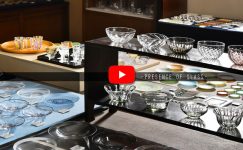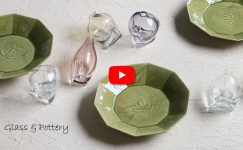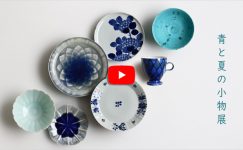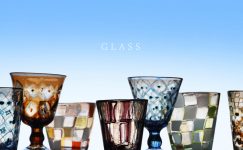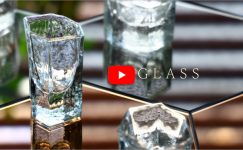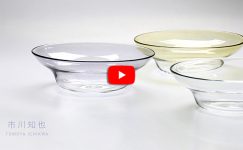English version of the interview here.
Marbles
Hanada: Please tell us about your path to becoming a glass artist.
Tomoya Ichikawa: Back then, it was the employment ice age, and I also thought, “Knowing my personality, if I choose an office job where I have to wear a tie, I’ll probably quit right away.”
But I had to work, and I didn’t want to quit easily. I didn’t want to make excuses either.
“So if it’s a job I choose because I love it…”—that was the answer I reached at the time.
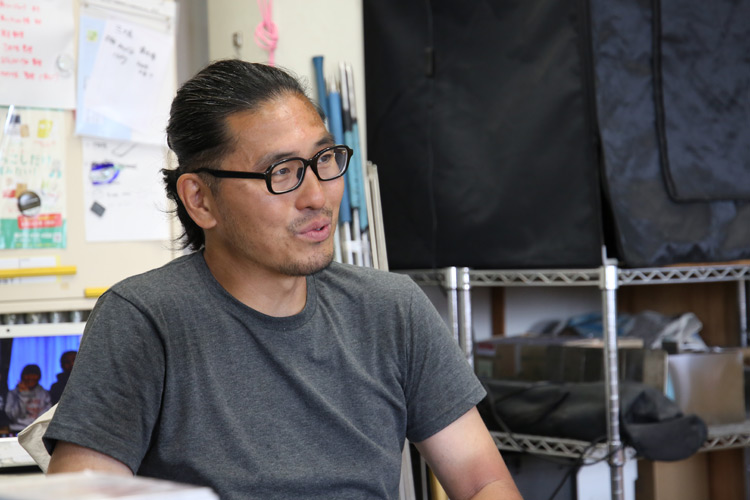
Hanada: What were you interested in at that time?
Tomoya Ichikawa: Vintage clothing.
At the time, Levi’s 501XX and the like were very popular.
A classmate from middle school already had a shop in Amerika-mura (Osaka), so I decided to work there.
I enjoyed customer service itself, but the evaluations were not about style—they were purely about whether the item was old.
Even if jeans were oversized or too tight, people would value them just because they were from “the WWII model,” and boots were the same… everyone looked like Mickey Mouse because the sizes were huge. I kept thinking, “This is definitely weird.”
Hanada: (laughs)
Tomoya Ichikawa: One day, while thinking about my future alone in my room, my eyes landed on a large glass bowl full of marbles I used to collect in elementary school.
Even though I had left almost everything at my parents’ house when living alone, for some reason I had brought only that with me…
Hanada: Those things tend to catch your eye at moments like that.
Just at the Level of “I Like Glass”
Tomoya Ichikawa: After that, all I could imagine was myself blowing glass (laughs).
At the library, I found a thick encyclopedia-like book that had “Edo Kiriko,” “Satsuma Kiriko,” and “Hizen Vidro.”
I heard Satsuma Kiriko only accepted local people, so next I contacted Hizen Vidro in Saga, and they said, “Come anytime.”
So I thought, “Saga is okay then!” and the next day I called again saying, “I got a Shinkansen ticket, so I’ll come tomorrow.” Then they were like, “Where on earth are you coming from?”
Apparently they had misheard Shiga as Saga. When I said, “I’m from Shiga,” they replied, “We only take people from Saga.”
Hanada: (laughs)
Tomoya Ichikawa: Then I called what I thought was Edo Kiriko, but it turned out to be some glass-related association, and the conversation kept going nowhere.
They asked, “What do you want to do in glass?” but since I knew nothing, all I could say was, “Well… something with glass,” so they probably thought I was an idiot.
Eventually, they introduced me to a glass factory in Tokyo.
When I arrived, it was a huge factory.
The president looked at the workers and said, “These guys rotate from time to time. Some just disappear, but the total number stays the same, so it’s fine.”
They told me to live in the dorm with those “rotating” people, which scared me, so I desperately searched for the next place and found a factory in Osaka.
At that point, it wasn’t even about “liking glass”—I just wanted a place where I wouldn’t have to quit (laughs).
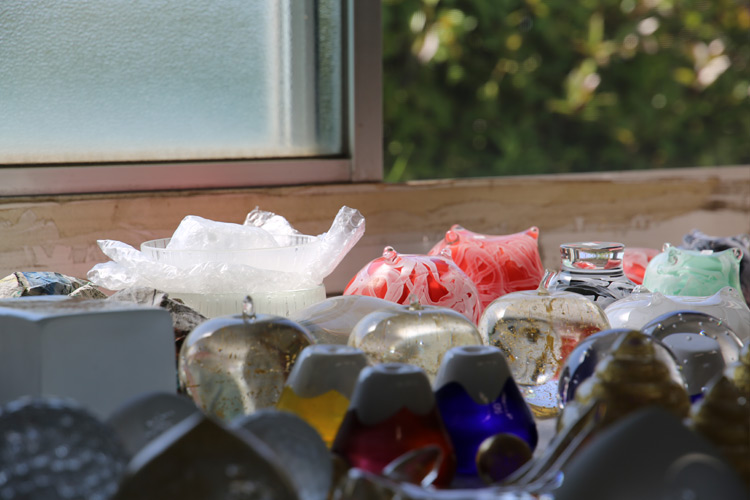
So Many Shocking People
Hanada: How was the Osaka factory?
Tomoya Ichikawa: When I went for the interview, there were a bunch of intimidating people, but when I returned a week later for my first day of work, all of them were gone.
The president said, “Business is bad, so I fired all of them first.”
They were skilled but unbelievable people.
One said, “My wife left for the public bath three years ago and hasn’t come back.”
And since glass factories use heat, they usually have a big bath, but in the changing room, someone was living there (laughs).
Those guys—Mr. Matsuda and someone named Higashi something—would take me drinking on Saturday nights.
Even though they looked shabby at the factory, they suddenly looked cool with neatly parted hair when going out.
But at the bar, they used different names (laughs).
And they’d get angry: “Don’t call me Matsuda.”
It was my first time meeting someone living under an alias.
Let me tell you the craziest story of them all.
Hanada: There’s an even crazier one?
Tomoya Ichikawa: There was a quiet, skilled craftsman who used to polish crystal in Yamanashi. Compared to that, polishing glass was very easy for him.
He was a thin old man and a twin. The older twin was more skilled but alcoholic… so he came and went inconsistently.
When he didn’t show up, we had to go call him at home. One day, no matter how many times we called him, he wouldn’t wake up, so the president got irritated and said, “I’ll go.”
Then the president didn’t come back either.
In the evening he returned angrily, saying, “He was dead. And at the busiest time!”
Back then I thought, “Someone just died and that’s what you say…?” but now I feel—though it may sound inappropriate—that I witnessed something fundamental about “living.” It was a tough but real world.
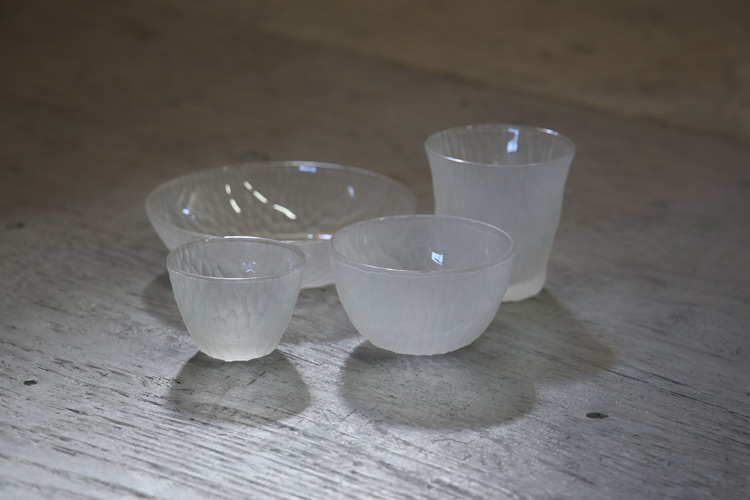
Easy to Say, Hard to Do
Hanada: Even with everything, it was a job you chose because you loved it.
Tomoya Ichikawa: Exactly. That’s why I could endure it.
At lectures for young people, they often say, “First, find what you love.”
It’s easy to say but the hardest thing to do. But that’s exactly where I started.
It took time at first, but I was fortunate.
Hanada: It must have been difficult at the beginning.
Tomoya Ichikawa: It was tough.
I couldn’t do anything, so while walking the factory dog or making deliveries, I’d see people my age, clearly new office workers, walking in suits looking lively.
Even though I had chosen not to wear a suit, I envied them terribly.
And then I hated myself for feeling that way.
The Story of the Ponte
Tomoya Ichikawa: The Osaka factory’s business declined after the bubble burst, so I began looking for a glass studio.
Every time I called, they’d ask, “Can you do ponte?”
But the factory I’d been in used molds, so there was no need for ponte, meaning I had no idea what it was.
When I answered, “No,” they’d reject me on the spot.
So I thought, “Apparently ponte is important,” and started saying, “Sometimes I can, sometimes I can’t.”
Hanada: (laughs)
Tomoya Ichikawa: There’s absolutely no such thing as sometimes being able to do ponte and sometimes not (laughs).
They probably thought I was even more of an idiot.
Eventually, while making a custom piece by chance, someone said, “This is ponte.”
And I thought, “Ah, so this is the famous ponte” (laughs).
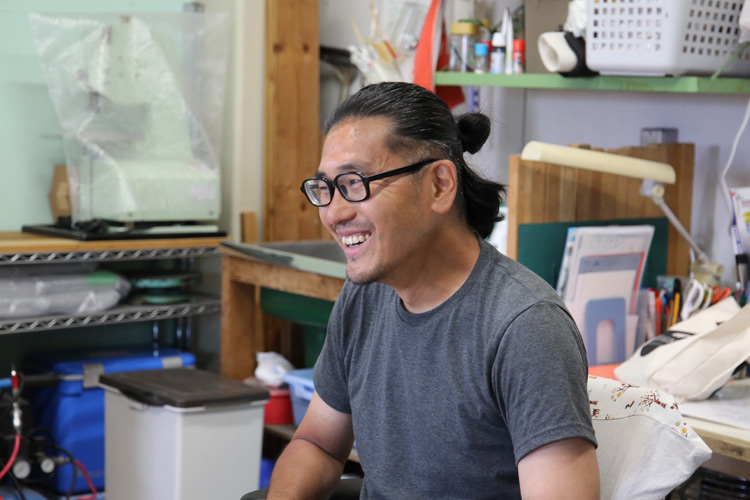
Hanada: So you could finally pass the phone interviews.
Tomoya Ichikawa: Sometime later, I called Mr. Kuniaki Kuroki’s studio.
“I’m working at a small factory now. I can do ponte,” I said.
Mr. Kuroki himself had worked his way up from factories and was looking for someone like that, so I fit perfectly.
He said, “Come visit.” I practiced ponte desperately, thinking he’d make me do it.
When I arrived, he said, “Let’s go eat,” and despite not being able to drink alcohol, I kept thinking, “When is he going to make me do ponte?”
In the end, he just said, “You should get going to catch your flight,” and I thought, “Wait, there was no ponte!” (laughs).After organizing things, I quit the Osaka factory.
Hanada: The president must have been sad.
Tomoya Ichikawa: He said, “You’re quitting? At the busiest time!?” (laughs)
A New Environment
Hanada: You began working under Mr. Kuroki in a completely different environment.
Tomoya Ichikawa: I wanted to blow glass, but three others were ahead of me. Still, I thought, “I will not lose.”
Hanada: Because you had survived tough environments.
Tomoya Ichikawa: Yes. So whenever Mr. Kuroki said, “Want to try this?” others hesitated, but I felt grateful for any chance and raised my hand immediately, even on days off.
Eventually, after about six months, I was allowed to blow glass.
Hanada: Your attitude toward work was recognized.
Tomoya Ichikawa: I enjoyed it. I always thought, “There is something I want to do here.”
On days off, I could practice, and Mr. Kuroki always acknowledged what we did.
I once dreamed of becoming his right-hand or foreman, but when I thought about the future I wanted, I knew I needed to work under my own name someday.
So I consulted him and decided to move to Toyama Glass Studio.
Hanada: How long were you with Mr. Kuroki?
Tomoya Ichikawa: Fourteen years.
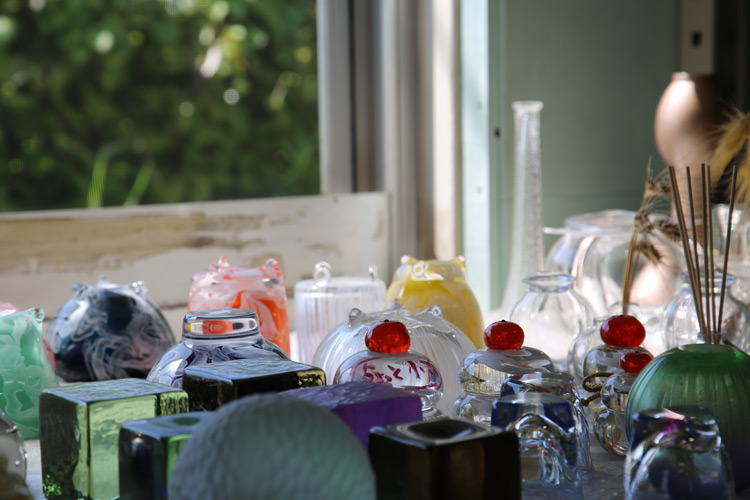
To Toyama
Hanada: And again, Toyama was a new environment.
Tomoya Ichikawa: I had pride in having worked under Mr. Kuroki, and his pieces—even expensive vases—sold one after another.
His fans also praised us apprentices, so it was easy to get the wrong idea.
I knew I shouldn’t let that happen, but I probably had already become that way.
When I tried making my own pieces, they turned out like copies of his, and when I forced myself to change them, they were just… strange.
At the studio’s newcomer exhibition, I was excited to “make whatever I liked,” but my peers’ works were clearly more appealing. I deeply realized that technique alone wasn’t enough.
Two years later, during a glass studio exhibition at a Tokyo department store, you stopped by.
But you asked, “Can you introduce me to another artist?” and left.
I thought, “What, not me?” (laughs).
Hanada: My apologies (laughs).
Tomoya Ichikawa: No, it helped me understand exactly where I stood, and I appreciated the honesty.
A year later, at my solo exhibition, you came again. And now here we are.
Hanada: It has been ten years since then.
Enjoyable and Careful
Hanada: What are the fundamentals you value in making things?
Tomoya Ichikawa: Tableware should follow standard proportions.
For cups, I decide what drink they are meant for, and then design accordingly.
Also: “enjoyably” and “carefully.”
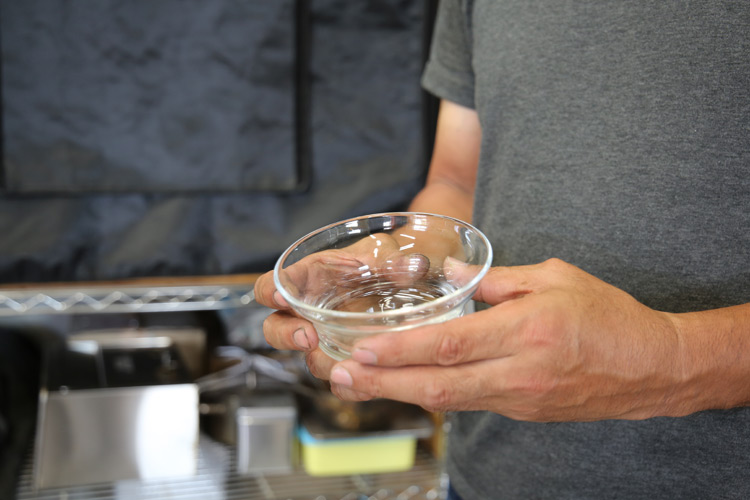
Hanada: What do you mean by “enjoyably”?
Tomoya Ichikawa: Feeling genuinely excited about what I’m making, recalling conversations with customers—things like that.
Being “careful” is easy if you’re mindful. But “enjoyable” is harder.
I finally feel I’ve reached a stage where I can think about such things.
Hanada: Anything technical you think about?
Tomoya Ichikawa: Technically, these methods have existed since the ancient civilizations. They haven’t changed dramatically.
Even if I try something new, most of the time I find it already existed. It’s incredible.
The Sun Series
Hanada: Among the works you’ve made, which hold special meaning?
Tomoya Ichikawa: The Sun Series. After becoming independent, I wanted to create everyday glassware. Even if I removed decoration, I needed a core element, so I made this series.
When I looked inside after finishing one, it sparkled so brilliantly that I thought, “Wow, this is amazing!”
And people who saw them felt the same way.
Feeling that my sense connected with others gave me fulfillment, and I finally felt I had made something I could call my own work.

Hanada: We look forward to your two-person exhibition with Haruya Abe.
Tomoya Ichikawa: I’m considering making 7- and 8-sun plates that would work beautifully with cold noodles.
Hanada: I look forward to seeing them at the exhibition. Thank you.
≪ END ≫
ビー玉
花田:市川さんがガラス作家になるまでの歩みを教えてください。(以下花田-)
市川:僕の頃は就職氷河期だった上に「自分の性格だとネクタイ締める仕事を選んでも多分すぐ辞めるだろうな」とも思っていました。
でも、仕事はしなければならないし、簡単に辞めたくもない。言い訳もしたくない。
「自分が好きで選んだ仕事なら・・・」がその時の答えでした。

-:当時は何が好きだったのですか。
市川:古着です。
当時、リーバイス501XXなんかが人気でした。
で、中学の同級生がすでにアメリカ村で店をやっていたので、そこで働かせてもらうことにしました。
接客の仕事自体は楽しかったです。ただ、その時の評価って「着こなしが格好いい」じゃなくて「古いかどうか」なんです。
オーバーサイズでウエストブカブカでも、小さくてツンツルテンでも「これは第2次世界大戦のモデルや」で評価されてしまう。
ブーツも流行っていて、でもサイズがメチャクチャ大きいから、みんなミッキーマウスみたいなんですよ。「いやほんとに、これ、絶対おかしいって」と。
-:(笑)
市川:そんなこともあって、一人、部屋で将来のことを考えていた時に、小学校の時に集めていたビー玉で一杯の大きなガラスのボウルが目に入ってきました。
当時、一人暮らしで、持ちものはほとんど実家に置いてきていたのに、なぜかそれだけは、持ってきていて・・・。
-:そういうタイミングで目に入ってくるものなのですね。
「ガラスが好き」とかいうレベル
市川:そうなると、頭の中はガラスを吹いている自分の姿しかいない(笑)。
で、図書館で色々調べていたら、分厚い図鑑みたいな本に「江戸切子」「薩摩切子」「肥前ビードロ」がでてきました。
薩摩切子は地元の人間しかとらないというので、続いて佐賀の肥前ビードロに連絡したら「いつでもいいから来てくれ」って。
「佐賀は大丈夫なんだ!」と思って、次の日「新幹線のチケット取れたので明日行きます」って電話したら「お前、どっから来んねん」みたいになって・・・。
どうも佐賀と滋賀を聞き間違えていたみたいで「僕、滋賀出身ですよ」って答えたら「うち、佐賀しか取らん」て。
-:(笑)
市川:次は江戸切子に掛けたつもりが、どこかのガラス関連の組合に電話を掛けてしまっていたみたいで、話していてもしっくりこない。
「君はガラスの何がしたいんや」と聞かれて、でも何も分かりませんから「とりあえずガラスで」としか答えられなくて「こいつアホやな」みたいな扱いになっていて、会話も堂々巡りでしたが、なんとか東京のガラス工場を紹介してもらいました。
で、行ったら、大きな工場でした。
そこの社長、従業員の人たちのことを見て「こいつら、たまに入れ替わるんだよ。
勝手にいなくなるのもいるけど、合計の人数は変わらんから大丈夫」って言うんです。
その工場の寮に、その入れ替わる人たちと一緒に住めと言われて、さすがに怖いなと。
全力で次を探して、大阪の工場を見つけました。
もう「ガラスが好き」とかいうレベルじゃなくて、とにかくやめないで済むところに行きたい一心です(笑)。

ビックリな人ばかり
-:大阪の工場はいかがでしたか。
市川:面接で行った時にいた強面の人たちが、1週間後に出社したら、皆いなくなっていたんです。
そこの社長「景気が悪いから、まずあいつらから全員クビにした」って。
腕はいいけど、ビックリな人ばかりでした。
例えば「うちの嫁さんは『銭湯行ってくる』って言って、3年帰ってきてないよ」とか言っている人もいるし・・・。
あと、ガラス工場は熱を使うから、大体、大きめのお風呂があるんですが、そこの脱衣所になぜか人が住んでいるんですよ(笑)。
その人たち、たしか松田さんと、東なんとかさんって言うんですが、土曜日の夜に飲みに連れていってくれるんです。
工場ではボロボロの格好をしていても、その時は七三分けでメチャ格好よくなっていました。
でも、飲み屋さんに行くと、名前が変わるんです(笑)。
そして「俺のこと、松田って呼ぶな」って怒られる。
偽名で生きている人、初めて見ました。
中でも1番クレイジーだなと思った話をしてもいいですか。
-:もっとすごい話があるのですか。
市川:物静かで、腕のいい職人さんがいました。
元々は山梨で水晶を磨いていたそうで、それにくらべたら、ガラスを磨くなんで、実に簡単らしいです。
ひょろっとしたおじちゃんなんですけど、双子なんです。
腕がいいのはお兄ちゃんのほうでしたが、アル中で・・・。だから、来たり、来なかったり・・・。
来ないと、家まで呼びに行かされていました。ある日、何度呼んでも全然起きてこなかったんです。そうしたら、社長が苛立って「俺が行く」って。
でも、今度はその社長が全然帰ってこないんですよ。
心配していたら、夕方くらいに社長が怒りながら帰ってきて「あいつ死んどったわ、この忙しい時に!」って。
当時は「人ひとり亡くなって『忙しい時に』って・・・」と思いましたが、今思えば―不謹慎かもしれませんが―「生きていく」ことの根本を見た気がします。逞しい世界でもありました。

言うのは簡単だけど
-:色々あっても、好きで選んだ仕事です。
市川:そうです。だから我慢できる。
よく、若い子たち向けのレクチャーなんかで「まず好きなことを見つけなさい」みたいなところから始まるでしょう。
それ、言うのは簡単だけど、一番難しいんですよね。でも、僕はそこからスタートしています。
最初は時間かかったけど、恵まれていたんだなって。
-:最初は大変だったことと思います。
市川:はじめは苦しかったです。
何にもできないから、工場で配達やそこの犬の散歩をさせられていると、その横を明らかに新入社員で、僕と同じ年の人たちがスーツを着て活き活きと歩いていく。
スーツを着ないって決めて始めたはずなのに、そういう人たちが羨ましくて仕方がない。
そういう自分にもまた嫌気がさしてくるんです。
ポンテの話
市川:大阪の工場も、バブル経済崩壊で業績が落ちてきてしまい、ガラス工房を探し始めました。
電話すると「ポンテできますか」って必ず聞かれるんです。
でもそれまでいた工場は型抜きなので(ポンテを必要としない) 「ポンテ」と言われても何のことか分からない。
「できません」と答えると、そこで断られてしまう。
「どうやらポンテは、出来たほうが良いんだな」と思って、次から「できる時もありますし、できない時もあります」って。
-:(笑)
市川:ポンテが出来る時もあれば出来ない時もあるなんてこと、絶対ないじゃないですか(笑)。
多分もっとアホだと思われたはずです。
そのうち、たまたま特注のものを作った時に「これがポンテだよ」って教えてもらいました。
「これが噂のポンテか」って(笑)。

-:やっと電話面接はクリアできそうですね。
市川:その後、しばらくして電話したのが、黒木国昭先生のところでした。
「今、町工場で働いています。ポンテできます」って。
先生ご自身が工場からの叩き上げで、そういう人を探していたそうで、僕はちょうどよかったようです。
「じゃあ、一度見に来い」って。ポンテやらされると思って、一生懸命練習していきました。
到着したら「ちょっと飯でも食うか」って誘われて、飲めないお酒でヘロヘロになりながら「いつポンテやらされんのかな」って、ずっと構えていました(笑)。
で結局「そろそろ飛行機の時間だろ」みたいになって「あれ、ポンテ、なかった」って(笑)。
大阪の工場にも本当にお世話になったので、色々整理して退職しました。
-:社長さん、寂しがったのではないですか。
市川:社長「お前、やめんのか!この忙しい時に!」って怒っていました(笑)。
環境が変わって
-:全く環境の違う黒木さんの下での仕事が始まります。
市川:ブローをやりたかったのですが、すでに希望者が僕の前に3人いました。でも「絶対負けへん」て。
-:厳しい環境を乗り越えてきたからこそ、ですね。
市川:だから、ちょっとしたことでも先生から「やるか」って言われた時、みんなは一瞬考えるのですが、僕は「やらせてもらえるだけ幸せ」と思うから、休みの日でもなんでもすぐ手を挙げていました。
結局、半年ぐらいでブローに入れました。
-:仕事に対する姿勢が認められたのですね。
市川:楽しかったです。「自分にはここでやりたいことがあるんだ」っていつも思っていました。
休みの日なら練習してもいいし、黒木先生は、やったらやっただけ評価してくれます。
「いつか黒木先生の右腕や番頭さんみたいになれたらいいな」とも思っていましたが、自分の目指す将来を考えると、いつか自分の名前を看板に活動していったほうが良い。
黒木先生とも相談して辞めることにし、富山ガラス工房に来ました。
-:黒木先生のところにはどれくらいいたのですか。
市川:14年です。

富山へ
-:また富山では環境が変わりますね。
市川:黒木先生のもとでやっていたという自負もあるし、先生のものは、高価な壺でも次々と売れていく。
その上、黒木先生のファンの方々は、弟子の僕らのことも褒めてくれるので、勘違いしてしまうんです。
「そうなってはいけない」と思ってはいたけど、それでも多分そうなっていたはずです。
で、いざ作ってみると黒木先生のコピーみたいなものしかできないし、無理して違えようとすると「うん?」みたいなものしかできない。
工房の新人展で「好きなもの作っていいぞ」と言われて、張り切るんですけど、他の同期のもののほうが、明らかに魅力的でしたから。技術だけではうまくいかないことを痛感しました。
それから2年経った頃ですよ。東京の百貨店でガラス工房展をした時に、松井さんが寄ってくれましたよね。
でも、その時、松井さん、僕以外の作家さんを「紹介してくれ」って言って帰っていきました。
「なんだ、自分じゃないのかよ」とか思って(笑)。
-:失礼しました(笑)。
市川:いや、それが現在地であることが分かったし、はっきり断ってくれて逆にありがたかったです。
それから1年後の個展に、松井さん、来てくれましたよね。で、今に至ります。
-:あれから10年経ちますね。
楽しく、丁寧に
-:市川さんがモノづくりの基本とされていることは何ですか。
市川:基本的に食器は寸に従います。
コップについては、何を飲むか設定してから、そこに合わせていきます。
それと「楽しく」「丁寧に」です。

-:「楽しく」とはどういうことですか。
市川:純粋に作っているものに対してワクワクしたり、お客さんとの会話を思い出しながら作ったり・・・そんな感じです。
「丁寧に」は意識すればできます。ただ「楽しく」というのは、なかなか難しい。
ようやくそういうことを考えられる段階に来たのかなという感じです。
-:技術的なことで考えていることはありますか。
市川:技術的には4大文明の時からあるもので、そこから大きく変わっているわけでもありません。
何か新しいことを試みても、調べてみると大体既に存在しています。すごいことです。
Sunシリーズ
-:これまで作られたもので、思い入れのあるものは何ですか。
市川:Sunシリーズは、独立後、普段使いのガラスを目指して、装飾を引き算していくにしても、芯になるものが必要だなと思って作ったものです。
作って中を覗くと、すごいキラキラしていて「これ、すごい!」と自分で感激しました。
で、見てくれた人たちも自分と同じような感想を持ってくれたんです。
自分と他の人の感覚が繋がることで充足感を持てたし、ようやく自分の作品と呼べるものができた気がしました。

-:阿部春弥さんとの二人展、よろしくお願いします。
市川:7、8寸のワンプレートで、冷たい麺なんかが合いそうな器も、今考えています。
-:展示会で拝見するのを楽しみにしています。よろしくお願いします。













